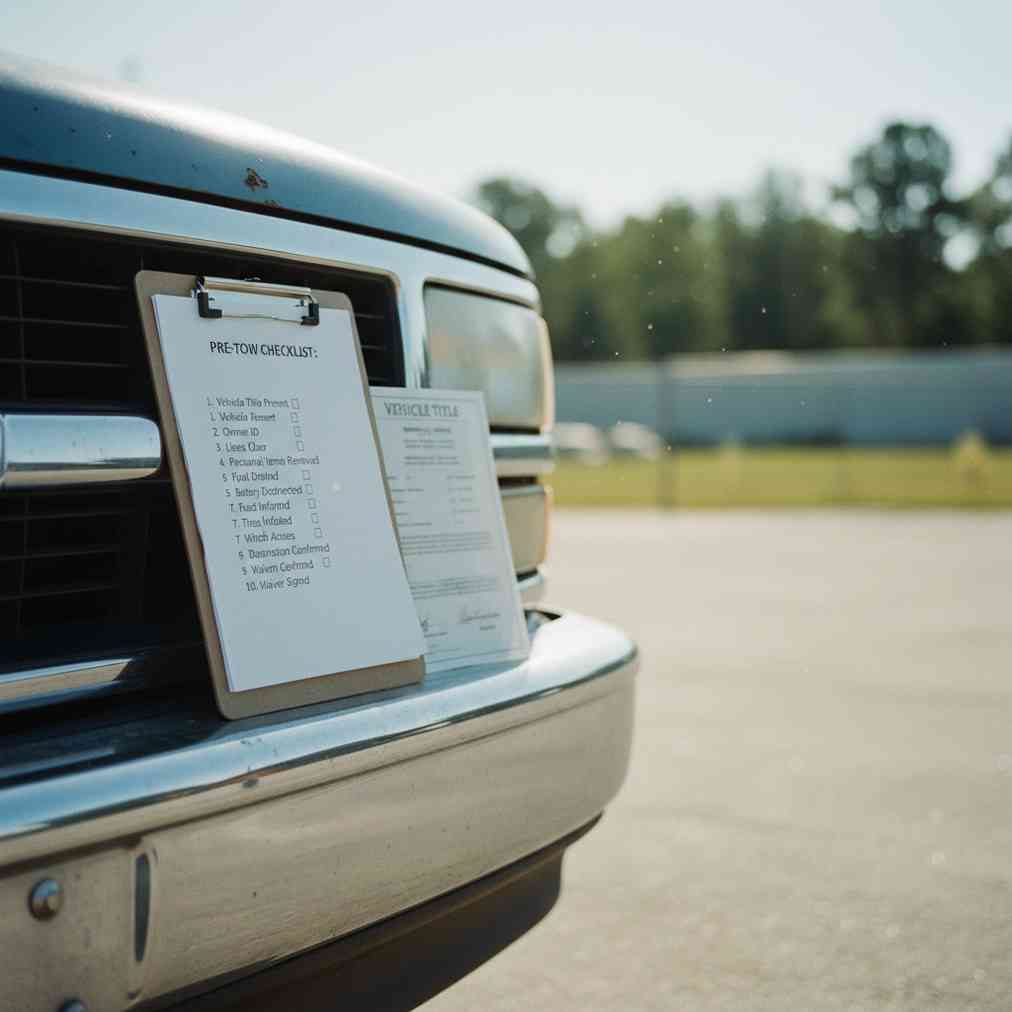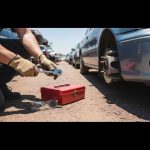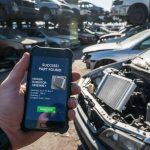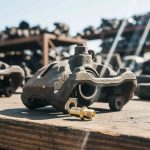Pre-Tow Checklist for Junk Cars
Taking the right steps before your junk car is towed away ensures a hassle-free experience and may increase your payout. Proper preparation can make the difference between a smooth transaction and unexpected complications.
Clean Out the Car Thoroughly
Remove all personal belongings, including documents, electronics, and valuables. Check the glove compartment, trunk, under seats, side pockets, and center console, as these are common places for forgotten items. A thorough cleanout also makes it easier for the buyer to dismantle or tow the vehicle.
- Glove compartment – Insurance papers, registration, phone chargers
- Trunk space – Tools, spare tire, emergency kits
- Under seats – Coins, jewelry, small electronics
- Door pockets – CDs, sunglasses, parking passes
- Center console – Personal documents, cash
Gather Necessary Documentation
Almost every buyer—charity, junkyard, or scrap service—will ask for proof of ownership, typically the vehicle title. If the title is missing, you may need to obtain a duplicate from your local DMV. A valid photo ID and, sometimes, the registration are also required. Signing over the title properly releases you from future liability, while failing to do so can cause legal problems.
| Required Documents | Purpose |
|---|---|
| Vehicle Title | Proves legal ownership |
| Photo ID | Verifies identity for transaction |
| Registration | Additional proof if required by buyer |
| Lien Release | Shows loan is paid off (if applicable) |
Handle License Plates and State Requirements
Some states require you to remove your license plates when you transfer ownership. Check your state’s DMV regulations to avoid penalties. Depending on your state, you may need to file a damage disclosure with the DMV and surrender the license plates.
Choose a Reputable Buyer
Contact several junkyards near me or junk car buyers for quotes, especially those offering free towing. Compare offers and check reviews to ensure the company is reputable and licensed. Some service providers offer free towing and help with paperwork to streamline the process.
What Buyers Expect During Pickup
Understanding buyer expectations helps ensure a smooth transaction and prevents last-minute complications that could delay or cancel your sale.
Documentation Requirements
Buyers will expect you to provide a valid title (with no liens), proof of identity, and sometimes vehicle registration. Without these documents, most reputable buyers will not accept your vehicle. The title transfer process legally releases you from future liability for the vehicle.
Vehicle Condition and Accessibility
Buyers may also expect the car to be free of personal items and, ideally, free of hazardous materials (e.g., gas, oil, coolant), although most services handle disposal of fluids as part of the process. Make sure the car is accessible for the tow truck—clear obstacles, ensure the parking brake is released, and provide any keys required to move the vehicle.
- Clear access path for tow truck
- Vehicle keys available if car needs to be moved
- Accurate description of car’s condition provided in advance
- Personal items removed completely
Advance Information Requirements
Some buyers may require you to submit advance information about the car (make, model, year, damage) for a quote, so providing accurate details speeds up the process and helps avoid disputes upon pickup.
Understanding Free Pickup Offers
Free towing services have become increasingly common as competition grows among junk car buyers. Understanding how these offers work can help you maximize your return and avoid hidden fees.
How Free Towing Works
Most reputable cash for junk cars services absorb towing costs as part of their business model. They factor the towing expense into their offer, meaning you receive the quoted amount without deductions. This is especially valuable for non-running vehicles that would otherwise be expensive to transport.
“Free towing is now a standard offer from most reputable junk car buyers, especially for larger or more valuable vehicles. The competition has driven this service to become an expected part of the transaction.”
Getting the Best Deal
To maximize your payout, get an instant quote for junk car from multiple buyers. Consider factors beyond just the cash offer, including the reputation of the buyer, their licensing status, and customer reviews. Some buyers may offer higher amounts but charge hidden fees, while others provide transparent pricing with free pickup included.
| Service Feature | Reputable Buyers | Less Reliable Buyers |
|---|---|---|
| Towing Fees | Included in offer | May charge separately |
| Payment Method | Cash on pickup | Check or delayed payment |
| Quote Accuracy | Matches pickup offer | May reduce at pickup |
| Documentation Help | Assists with paperwork | Limited support |
Current Industry Trends and Developments
The junk car industry continues evolving with new technologies and service improvements that benefit both sellers and the environment.
Digital Transformation
Many companies now offer instant online quotes based on your vehicle details, streamlining the sales process. Advanced digital platforms allow sellers to upload photos, describe vehicle condition, and receive competitive offers within minutes.
Environmental Compliance Focus
Reputable auto recyclers increasingly highlight their adherence to environmental regulations, including proper disposal of hazardous materials and recycling commitments. This focus benefits both sellers and the broader community by ensuring responsible vehicle disposal.
- Proper fluid disposal – Oil, coolant, and brake fluid
- Battery recycling – Lead-acid battery safe handling
- Tire disposal – Environmentally responsible tire recycling
- Metal recovery – Steel and aluminum reclamation
National Platform Growth
National junk car buyers and online platforms have made it easier to compare offers and arrange pickup, reducing the need to visit local yards in person. These platforms often provide standardized service quality and transparent pricing.
Benefits of the Used Auto Parts Market
The junk car industry directly supports the thriving used auto parts market, creating value for both sellers and buyers of salvaged parts.
Significant Cost Savings
Used parts are significantly cheaper than new OEM parts, often costing 50% or less. This cost advantage makes vehicle repairs more affordable, especially for older vehicles where new parts may be expensive or difficult to find.
Parts Availability and Reliability
For older or discontinued models, used parts may be the only option outside of expensive custom fabrication. Many used OEM parts from reputable yards are tested and come with warranties, offering dependable performance at a fraction of the cost.
Environmental Impact
Recycling used parts reduces demand for new manufacturing, lowering the carbon footprint and supporting sustainability initiatives. Buying recycled auto parts helps keep materials in circulation rather than sending them to landfills.
Evaluating Used Auto Parts: A Buyer’s Guide
When buying used parts from a salvage yard, thorough inspection ensures quality and value for your purchase.
Visual Inspection Checklist
Check for cracks, rust, corrosion, or signs of wear beyond normal use. Pay special attention to mounting points and connectors that could affect installation.
- Surface condition – Look for excessive rust or corrosion
- Mounting points – Check for stripped threads or damage
- Electrical connectors – Ensure pins aren’t bent or corroded
- Moving parts – Test for smooth operation where possible
Functional Testing and Compatibility
If the part is electronic or mechanical (alternator, starter, etc.), ask if it can be tested before purchase. Confirm the part number and compatibility with your make and model. Bring your VIN if possible for accurate matching.
Warranty and Return Policies
Some yards offer a limited warranty on used parts—always inquire about coverage terms. Understand the salvage yard’s return policy in case the part does not work as expected. High-value parts often come with better warranty protection.
| Inspection Point | What to Check | Red Flags |
|---|---|---|
| Visual Condition | Surface wear, rust, cracks | Deep rust, structural damage |
| Functionality | Moving parts, electrical connections | Seized parts, damaged wiring |
| Compatibility | Part numbers, model years | Wrong fitment, modified parts |
| Completeness | All necessary hardware included | Missing bolts, brackets, sensors |
Expert Tips for Maximizing Your Junk Car Value
Industry experts recommend several strategies to ensure you get the best possible return when selling a junk car.
Timing Your Sale
Metal prices fluctuate based on market conditions, so timing can affect your payout. Research current scrap metal prices in your area to understand market conditions before selling.
Consider Valuable Parts
Some parts may be worth more when sold separately than as part of the whole vehicle. High-value auto parts like catalytic converters, airbags, or electronic modules might fetch premium prices if sold individually.
- Catalytic converters – High precious metal content
- Airbag systems – Expensive to replace, high demand
- Electronic control units – Costly new, good used market
- GPS/infotainment systems – Popular aftermarket items
Documentation Best Practices
Keep detailed records of your transaction, including the bill of sale, title transfer documentation, and payment receipts. Follow proper procedures to notify your state’s DMV of the title transfer to avoid future liability issues.
Common Mistakes to Avoid
Understanding common pitfalls helps ensure a smooth transaction and prevents costly mistakes when preparing your junk car for pickup.
Incomplete Vehicle Cleaning
“Almost all vehicle owners are guilty of leaving items in their cars occasionally. However, these items can quickly accumulate over time. Removing all personal belongings is crucial to ensure none of the owner’s items are in the vehicle at the time of sale.”
Failing to thoroughly clean out your vehicle can result in lost personal items and create complications during the pickup process. Take time for a complete cleanout to avoid these issues.
Accepting the First Offer
Many sellers accept the first offer they receive without shopping around. Getting multiple quotes from different buyers can significantly increase your payout and help you identify the most reputable service providers.
Ignoring State Requirements
Each state has different requirements for vehicle transfers and license plate handling. Failing to follow proper procedures can result in continued liability for the vehicle or penalties from the DMV.
Key Statistics and Industry Data
Understanding the scope and impact of the junk car industry provides valuable context for sellers and buyers alike.
- Over 12 million vehicles are recycled in the U.S. annually, contributing to a robust used auto parts market
- Free towing is now a standard offer from most reputable junk car buyers, especially for larger or more valuable vehicles
- Up to 80% of a car’s material content is recycled, including metals, plastics, and glass, supporting environmental sustainability
- Used parts can save buyers 50-75% compared to new OEM replacement parts
- The average junk car contains 2,400 pounds of recyclable steel
Summary: Complete Pre-Tow Preparation Checklist
Preparing your junk car for towing and free pickup involves careful attention to cleaning, documentation, and choosing the right buyer. Following this comprehensive checklist ensures a smooth transaction and maximizes your return.
| Step | Action Items | Important Notes |
|---|---|---|
| Vehicle Preparation | Remove all personal belongings, valuables | Check all compartments, trunk, under seats |
| Documentation | Gather title, ID, registration | Title is most critical document |
| Legal Requirements | Remove license plates if required | Varies by state – check DMV rules |
| Buyer Selection | Get multiple quotes, verify licensing | Compare total offers including towing |
| Pickup Preparation | Clear access, provide keys | Ensure tow truck can reach vehicle |
The junk car industry continues to evolve with improved digital tools, environmental focus, and competitive offers, making it easier than ever to turn a junk car into cash without hassle. Whether you’re selling a vehicle or looking to buy used parts, understanding these processes helps you make informed decisions and get the best value for your needs.





Leave a Reply
You must be logged in to post a comment.